A digital asset infrastructure company, a physical AI platform, and a 3D instruction technology firm took top honors at the annual Venture Dallas conference.
Venture Dallas announced its 2025 Startup of the Year winners at the George W. Bush Institute and Presidential Library in Dallas on October 30, selecting three companies from a record 140 nominations—the largest and strongest applicant pool in the award’s three-year history, according to Venture Dallas Chair and Perot Jain Partner Aaron Pierce.
StableCore won the Seed category, Worlds took Series A, and BILT claimed Series B and Beyond.
David Evans, managing partner of Sentiero Ventures and member of the Venture Dallas steering committee, presented the awards and explained the selection process. Nominees were divided into three categories based on development stage, then narrowed to 18 finalists. Students from the University of Texas at Dallas prepared one-page deal memos on each finalist for review by guest judges.
Venture Dallas aims to recognize “the best and the brightest of the Dallas startup community,” Evans said.
Seed-stage winner: StableCore
Digital infrastructure for community banks
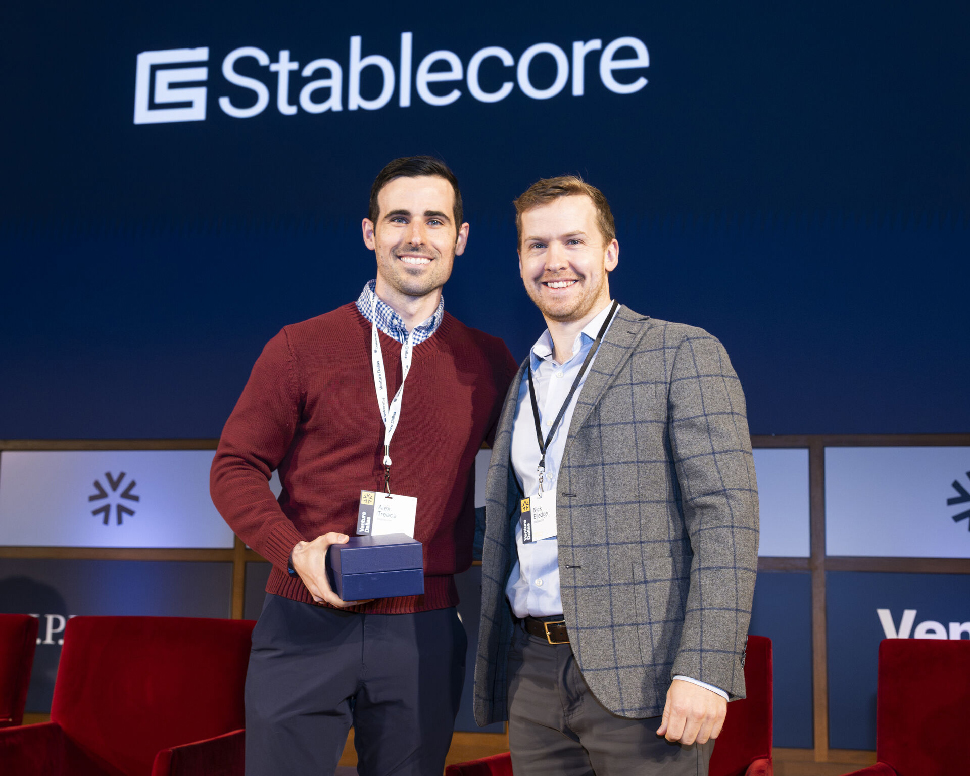
StableCore CEO Alex Treece, left, and COO Nick Elledge
Launched in 2025, Dallas-based StableCore took top honors in the seed category for building digital-asset infrastructure that helps community banks and credit unions compete in a world moving toward stablecoins and tokenized deposits.
Co-founded by CEO Alex Treece, COO Nick Elledge, and CTO Eduardo Montemayor, the startup recently closed a $20 million funding round, backed by investors collectively representing more than 290 FDIC-insured institutions. The round included investments from Norwest, BankTech Ventures, Coinbase Ventures, Bank of Utah, Curql, EJF Ventures, Bankers Helping Bankers, Peterson Ventures, Reflexive Capital, Stack Asset Management, Ensemble VC, and Naval Ravikant.
The raise was aimed at accelerating StableCore’s push to bring “digital asset core” technology to regional and community institutions that lack the resources to build it themselves, the company said in a September announcement.
StableCore’s platform pulls together pieces like custody, key management, blockchain infrastructure, compliance, orchestration, and ledgering into a single system it describes as a “digital asset core.” The goal is to let banks and credit unions offer stablecoin and digital-asset products, enabling them to compete with challenger fintechs and retain primary financial relationships with customers.
According to Elledge, the team has assembled veterans who previously designed, built, and managed digital asset infrastructure at Coinbase and other major platforms.
Over the past decade, digital financial products have grown into multi-trillion-dollar markets, but most traditional banks and credit unions have largely sat on the sidelines amid unclear U.S. rules, the company noted. This year, after Congress passed the GENIUS Act and federal regulators—including the OCC, FDIC, Federal Reserve Board, and SEC—updated their digital-asset policies, those activities became permissible for roughly 8,500 banks and credit unions across the country, according to StableCore.
On LinkedIn, Elledge described the Venture Dallas win as validation of the company’s core mission.
“StableCore is fundamentally re-architecting the core infrastructure for our financial partners,” he wrote. “We provide the stability, security, and next-generation compliance that allows banks and financial institutions to innovate safely and at scale.”
Elledge shared the company’s focus on supporting local economies. “Supporting our FDIC-insured bank and credit union customers into this new future is exciting and meaningful,” he wrote. “We wake up every day dedicated to supporting the job creators, local businesses, and competition that makes our economy great.”
SMU Cox School of Business also celebrated the win for one of its own. Elledge refined early ideas for StableCore through the school’s Spears entrepreneurship ecosystem.
“From early ideas refined through the Spears ecosystem to building a venture now recognized on the region’s biggest innovation stage, Nick’s journey embodies the entrepreneurial spirit that defines North Texas,” the school said in a social media post congratulating Elledge and co-founder Treece.
Series A winner: Worlds
Physical AI takes center stage
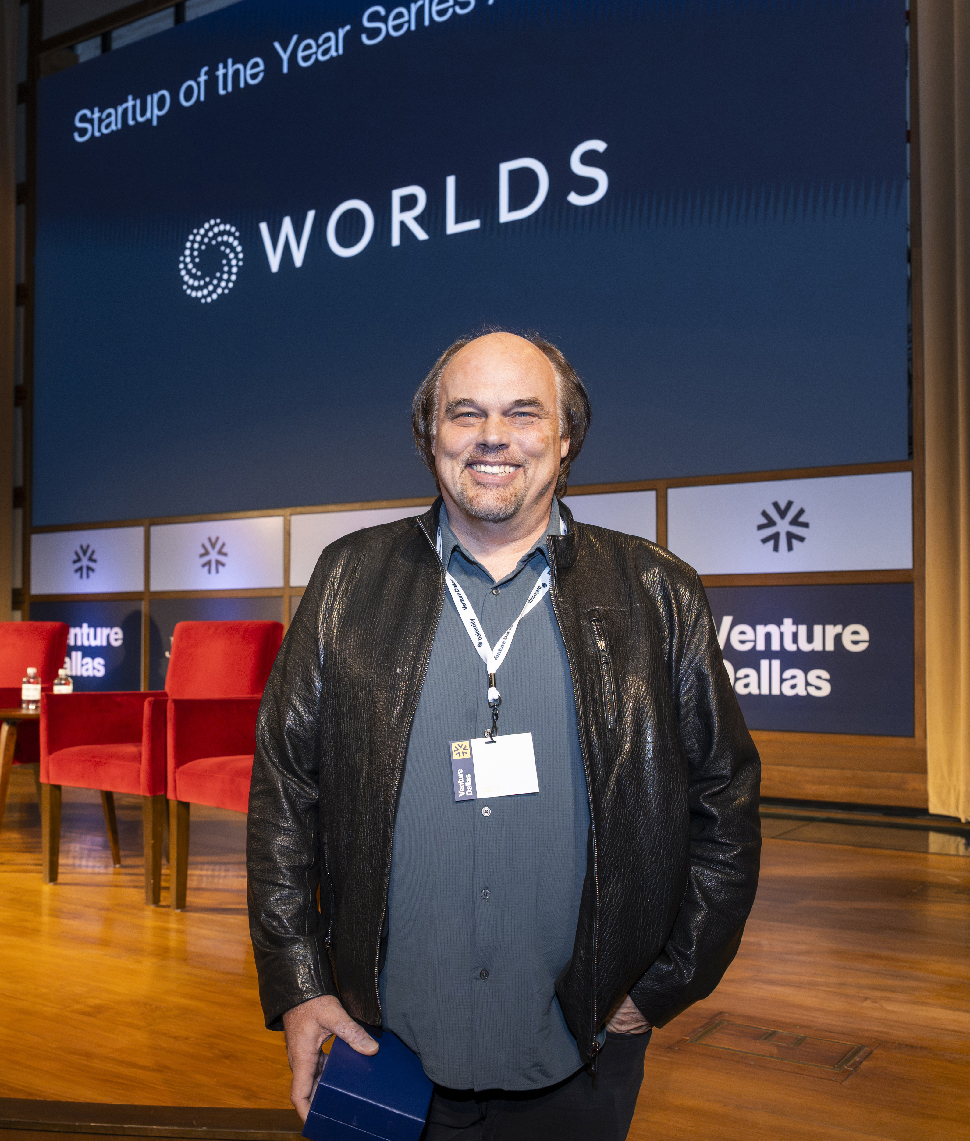
Dave Copps, CEO and co-founder of Worlds [Photo: Grant Miller Photograhy/Venture Dallas]
Worlds won the Series A category for technology that, as CEO Dave Copps put it after the win, “validates a fundamental shift in how intelligence and automation are being woven into the fabric of the physical world.”
The Dallas company has built an AI platform that connects to existing cameras and sensors across large-scale enterprise sites—some spanning up to four square miles—and converts real-time data into live spatial intelligence. Instead of ripping out and replacing infrastructure, Worlds plugs into what’s already there.
Rohde calls it “true sensor fusion at enterprise scale.” In practice, that means Worlds can read cameras, vehicle transponders, badges, and a range of other sensors together, not in isolation. Using an organization’s own unique operational data, the platform creates what the company calls “intelligent environments,” where AI agents can secure, automate, and speed up its physical operations.
Current clients include commercial distribution centers, manufacturing facilities, logistics operations, and mission-critical federal facilities, Worlds said.
“Physical AI is no longer a future technology—it’s happening today,” Copps said in a statement after the win. “It’s giving enterprises the power to see their operations at scale, and unlock transformative gains in productivity, efficiency, and safety.”
Rohde said the technology is “structural change on a massive scale”—not just an incremental upgrade. “2025 is the year physical AI goes mainstream,” he said.
To his point, the sector is currently drawing heavyweight attention: According to multiple reports this week, Jeff Bezos launched Project Prometheus, a new venture with $6.2 billion in funding aimed at developing “AI for the physical economy” and “industrial-grade” AI for sectors like manufacturing and engineering.
Worlds, founded in 2018 and emerging from stealth in 2020, is backed by Align Capital, Moneta Ventures, GPG Ventures, and strategic investors Chevron Technology Ventures, PIVA Capital, and HM Asset. Copps thanked investors in his acceptance remarks, noting that some had backed him through multiple ventures.
Bryan Chambers, co-founder of Venture Dallas, said the Worlds win reflects more than one company’s momentum. “Worlds represents everything Venture Dallas stands for—radical innovation rooted in North Texas, solving real-world challenges with transformative technology,” he said in a statement. “This recognition isn’t just about one company’s success; it reflects the strength and momentum of our region as a hub for world-changing AI innovation.”
Evans, the Sentiero managing partner who presented the awards, spoke to why Worlds stood out to judges. “When you see a team that has cracked both the technology and the market timing, you recognize something special,” he said. “Worlds has done both. Their ability to deploy AI at true enterprise scale, across existing infrastructure, positions them at the epicenter of a multi-trillion-dollar transformation.”
Copps framed the recognition as a win for the entire Worlds team, including co-founders Rohde and Ross Bates, COO Todd Steitle, CPO Ravi Sathyanna, and CFO Kristin Curreri Frost. On LinkedIn, he wrote: “Every team member at Worlds is all-in on creating something great together, and I could not be more proud of you.”
Series B and Beyond winner: BILT Inc.
3D instructions at enterprise scale
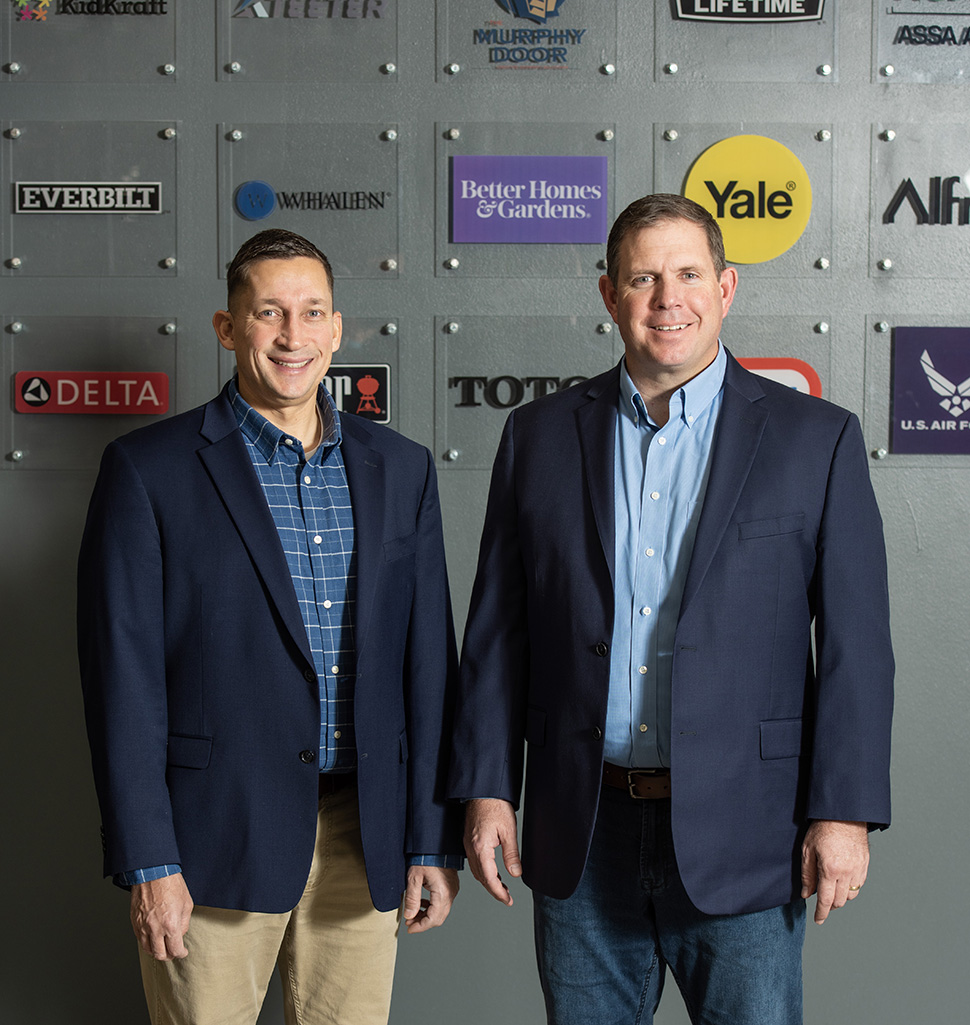
BILT Inc. Co-Founders Ahmed Qureshi, president and COO (left), and Nate Henderson, chairman and CEO. [Photo: BILT]
BILT Inc. won the Series B and Beyond category for its customer experience platform, which delivers “intelligent instructions”—guided by voice, text, and animated imagery—for thousands of products from hundreds of brands through its free mobile app.
The Grapevine-based company began a decade ago with a simple insight: paper instructions were failing users. The concept first took shape after a software sales executive struggled to assemble a sandbox in 2012 and wondered why consumer products didn’t have the same 3D guidance used in aerospace. A prototype built at SAP’s innovation incubator led to BILT spinning out of SAP in 2016. Dallas Innovates named BILT to its Future 50 list in 2023, recognizing the company’s distinctive position as a disruptor in its space.
Today, BILT works with manufacturers to turn assembly, installation, setup, maintenance, and repair into step-by-step 3D instructions that help customers work at their own pace. Brands provide the instructions at no cost to users because they reduce returns, lighten support volume, and improve overall satisfaction, the company says.
In addition to consumer products, BILT serves professional technicians and field crews, who can use its digital work instructions on tablets, phones, or the Apple Vision Pro to standardize complex procedures, speed onboarding and training, and reduce errors on the job.
BILT has increasingly become a partner in the federal space. The company was one of three Texas firms selected for an AFWERX Strategic Funding Increase in 2025 and later secured a $15 million STRATFI contract to move its platform from prototype to everyday use by U.S. Air Force maintainers.
As the company scales its work with commercial and government customers, BILT recently hired Chief Technology Officer Mitch Dawson to advance platform innovation amid heightened cybersecurity requirements. Chairman and CEO Nate Henderson described the hire as “a transformative moment for BILT,” saying Dawson “brings the technical depth and leadership experience critical to accelerating our AI strategy.”
Dawson described the company’s approach as “Instructions as a Service.”
“We’re reimagining instructions as intelligent, interactive experiences,” he said. The platform’s AI-driven capabilities are designed to make instructions adaptive for end users and “efficient to produce, maintain, and deploy across industries.”
2025 Startup of the Year finalists
If the winners show where North Texas startups are headed, the finalist list shows how deep the bench has become. Across Seed, Series A, and Series B & Beyond, this year’s contenders ranged from AI and fintech to healthcare and enterprise software:
SEED
Winner: StableCore, led by Alex Treece
Finalists
-
Callidus AI, led by Justin McCallon
-
Element3, led by Hood Whitson
-
Harbor, led by Kevin Lavelle
-
Profit.co, led by Bastin Gerald
-
Wink, led by Deepak Jain
SERIES A
Winner: Worlds, led by Dave Copps
Finalists
-
Autonomize Inc., led by Ganesh Padmanabhan
-
Backflip, led by Josh Ernst
-
Cercle.ai, led by Andreas Melder
-
OxeFit, Inc., led by Julia Anthony
SERIES B AND BEYOND
Winner: BILT Inc., led by Nate Henderson and Ahmed Qureshi
Finalists
-
AmplifAI, led by Sean Minter
-
Cariloop, led by Michael Walsh
-
Koya Medical, led by Andy Doraiswamy
-
Nada, led by John Green
-
OneDay, led by Clint Lee
-
Trust & Will, led by Cody Barbo
Capital, culture, and what comes next
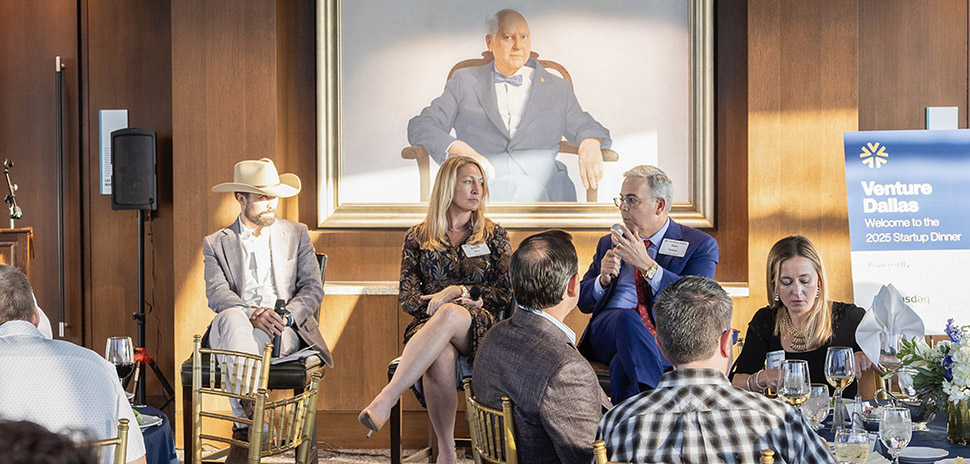
Aaron Pierce of Venture Dallas, Nasdaq listings leader Rachel Racz, and Susser Bank CEO Sam L. Susser share insights on scaling companies, governance, and capital strategy at a private dinner for semifinalists ahead of Venture Dallas 2025. [Photo: Venture Dallas]
Ahead of the awards presentation, Susser Bank and Nasdaq co-hosted a private pre-event dinner at the Petroleum Club in Dallas, bringing together Startup of the Year semifinalists—including nearly 40 founders leading high-growth companies—for a candid conversation about entrepreneurship and growth capital.
Rachel Racz, Nasdaq’s senior vice president and head of listings for Texas, the Southern U.S., and Latin America, joined Susser Bank Chairman and CEO Sam L. Susser and Venture Dallas Chair Aaron Pierce for the discussion.
In hindsight, the timing gave the conversation extra weight: just weeks after the event, Nasdaq announced Nasdaq Texas, a new dual-listing venue expected to become operational in 2026, pending regulatory approvals. The move puts another major public markets player on “Y’all Street” alongside NYSE Texas and the planned Texas Stock Exchange.
The playbook for founders
While the conversation covered everything from banking relationships to public-market readiness, Susser and Racz kept circling back to a theme: durable businesses attract capital.
For Susser—a Texas entrepreneur who helped build Stripes’ parent company into a multibillion-dollar enterprise before moving into banking—durability starts with leadership and structure.
“I can’t overestimate the power of having an extraordinary board of directors,” he said, urging founders to design governance for the company they want to become—not just the one they are today. Looking back, he said one of his biggest mistakes was being too cautious on talent beneath him, leaving “too much resting on my shoulders” when his own board was weighing a sale.
He also pushed founders to think hard about ownership and alignment, encouraging them to “put equity in the hands of as many people as you can in your companies,” but to make sure it vests slowly and is earned over time so that “people are really tight, everybody wanting to do the right thing” even when the founder isn’t in the room.
But there’s one risk that never goes away: running out of cash. Companies don’t usually fail because the idea is bad, he told them; they fail because they run out of money. “Most likely the reason you fail is you run out of cash,” Susser said. “Liquidity is everything. It’s true across industries. It was true 100 years ago. It’s true 50 years ago. It’s going to be true 50 years from today.”
Racz’s advice ran in parallel. “Governance is critical, leadership is critical,” she said. Her rule of thumb for operators was straightforward: “Build your company, make money and then, and then look at the capital markets. But don’t try to do it out of order.”
She also noted that Nasdaq works with companies long before they’re ready for a listing. Through Nasdaq Private Markets, the exchange helps growth-stage teams create employee liquidity and manage secondary transactions—tools companies like Palantir used before going public. Nasdaq also supports earlier-stage operators with everything from transfer agents to roadshow preparation, she said, part of a broader effort to help founders build real, financially sound companies long before ringing the bell.
Regional momentum
Susser also spoke to what makes today’s moment—and this place—so powerful for builders. “That really is the miracle of the United States,” he said. “Our ability to gather capital, deploy it efficiently, and let things happen in a fairly predictable legal climate.”
Pierce said the region has changed dramatically since Venture Dallas’ first 200-person event in 2018, when he described the landscape as “something of a venture desert.” This year, Dallas companies are expected to raise $2 billion in venture capital—four times the total just three years ago. The annual Venture Dallas summit has sold out four consecutive years.
“Every year, our startup community becomes stronger and stronger,” Pierce told the room. “This ecosystem is because of the great work that you all are doing.”
Don’t miss what’s next. Subscribe to Dallas Innovates.
Track Dallas-Fort Worth’s business and innovation landscape with our curated news in your inbox Tuesday-Thursday.
R E A D N E X T
-

North Texas has plenty to see, hear, and watch. Here are our editors’ picks. Plus, you’ll find more selections to “save the date.”
-

AI seem overwhelming? Just go to office hours.
-

Top executives at Nasdaq and Susser Bank celebrated high-growth potential companies contributing to region’s rise in entrepreneurship and innovation
-
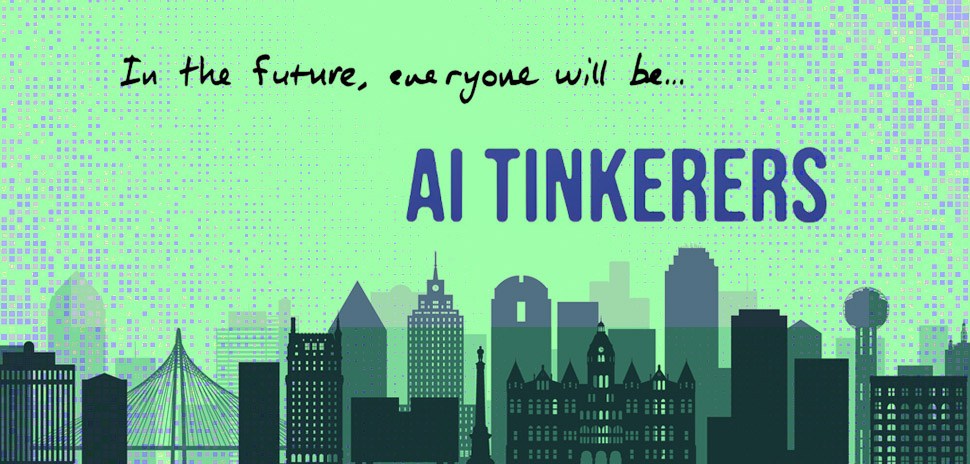
Data scientist Anmolika Singh put Dallas on the global AI Tinkerers map. At the first meetup, more than 30 pros—founders to Fortune 500 technologists—showed up to trade ideas, projects, and solutions.
-
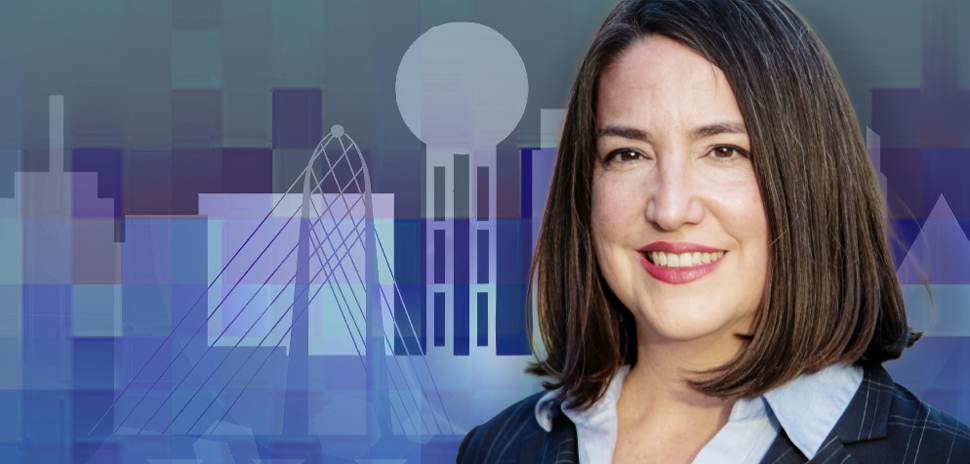
A familiar figure in Dallas arts, civic innovation, and public service, Cuellar will succeed longtime CEO Tony Fleo following a months-long search as Social Venture Partners Dallas plans its next 25 years.
![Among the leaders of the 2025 Venture Dallas Startup of the Year winners are BILT Inc. President and COO Ahmed Qureshi and Chairman and CEO Nate Henderson; Worlds CEO Dave Copps; and StableCore CEO Alex Treece and COO Nick Elledge. [Composite image: DI Studio]](https://www.europesays.com/us/wp-content/uploads/2025/11/o1-Venture-Dallas-2025-Startup-of-the-Year-Award-Composite.jpg)